-
 Art of Wellness Acupuncture & Traditional Chinese Medicine (TCM)11704 Wilshire Blvd, Suite 295, Los Angeles, CA, 90025
Art of Wellness Acupuncture & Traditional Chinese Medicine (TCM)11704 Wilshire Blvd, Suite 295, Los Angeles, CA, 90025
myartofwellness@gmail.com310-451-5522 Office Hours
MonClosedTue7:30 am --4 pmWed7:30 am --4 pmThu7:30 am -- 4 pmFri7:30 am -- 4 pmSat7:30 am -- 4 pmSunClosedOur office opens from Tuesdays to Saturdays 7:30 am to 4 pm, will be closed on Memorial day, Independent day, Labor day, Thanksgiving day, Christmas and New year.
-
Recent Posts
- Chinese New Year 2026: Year of the Horse
- Acupuncture and TCM Treatment for Perimenopause Symptoms
- How to Treat Insulin Resistance With Acupuncture and TCM
- How to Treat Metabolic Syndrome With Acupuncture and TCM
- How to Treat Syncope With Acupuncture and TCM
- How to Treat Thoracic Outlet Syndrome With Acupuncture and TCM
- How to Treat Dupuytren’s Contracture With Acupuncture and TCM
- How to Treat Nutcracker Syndrome With Acupuncture and TCM
- How to Treat Rosacea With Acupuncture and TCM
- How to Treat Perioral Dermatitis With Acupuncture and TCM
- Lymphatic Drainage With Acupuncture and TCM
- How to Treat Turf Toe With Acupuncture
- How to Treat Nerve Pain With Acupuncture and TCM
- How to Treat Watery Eyes With Acupuncture and TCM
- How to Treat Ovarian Cysts With Acupuncture and TCM
- How to Treat Dystonia With Acupuncture and TCM
- Sign up to receive news and updates and get my free report:“The Top 10 Reasons to Try Acupuncture”

November 2025 M T W T F S S 1 2 3 4 5 6 7 8 9 10 11 12 13 14 15 16 17 18 19 20 21 22 23 24 25 26 27 28 29 30
Stress
How to Treat Musculoskeletal Pain With Acupuncture and TCM
By Qineng Tan, L.Ac., Ph.D. & Xiaomei Cai, L.Ac., Ph.D.

Do you experience unexplained pain all over the body? Muscle pain and tenderness, along with feeling tired all the time and having mood issues? Widespread musculoskeletal pain accompanied by fatigue or feeling exhausted may be a sign you have fibromyalgia. Alternative medicine methods like Acupuncture and TCM offer a way to help ease the chronic pain, sleep problems, and emotional disturbances caused by fibromyalgia.
Fibromyalgia (sometimes referred to as “fibro” or FM) is one of the most common chronic pain conditions worldwide, affecting an estimated 10 million people in the United States alone. Still, this chronic condition is still not well understood by medical science. There are no definitive tests to show whether or not fibromyalgia is the cause of pain all over the body along with chronic fatigue, so many people go on having musculoskeletal problems and hurting all over without being diagnosed or treated. There are many people who have fibromyalgia who also suffer from depression and anxiety related to the illness. Fibromyalgia can dramatically impact a person’s quality of life. While people of ages and genders can have fibromyalgia, it is much more prevalent among women.
Fibromyalgia is considered to be a syndrome: a collection of symptoms that often occur together. Fibromyalgia is associated with other conditions like lupus, rheumatoid arthritis (RA), myofascial pain syndrome, and myalgic encephalomyelitis/chronic fatigue syndrome (ME/CFS). It may coexist with these other chronic conditions, or sometimes be mistaken for one of them. However, fibromyalgia is now understood by medical professionals to be its own distinct condition with specific manifestations.
People who have RA have been shown to have an increased risk for also having fibromyalgia. But the quality and location of the musculoskeletal pain differentiates the two conditions. The pain of fibromyalgia shows up in the musculoskeletal system in the areas where there are large muscles, causing pain that may move around throughout the torso, back, hips, thighs and arms. Fibromyalgia pain is often described as a kind of “tenderness,” or when the body aches all over. “Tender points” all over the body are specific to fibromyalgia. This is different from arthritis, which generally causes swelling and pain in the joints. Both RA and lupus are understood to be caused by inflammation, while fibromyalgia is believed to be caused by a problem with the central nervous system (CNS), in which pain signals are amplified, causing extreme sensitivity and pain, even when there is no seeming reason for that area of the body to feel pain.
Some of the fibromyalgia symptoms are very similar to those of myalgic encephalomyelitis (ME), which is also known as chronic fatigue (CFS). As with RA and lupus, the two conditions can overlap. The difference is that the overwhelming symptoms of ME/CFS are related to fatigue or post-exertional malaise (PEM), while the predominant symptom of fibromyalgia is widespread muscle pain and tenderness.
Fibromyalgia seems to show up in some people due to a traumatic or triggering event. There can then be a fibromyalgia flare up due to the presence of other triggers later.
Fortunately, acupuncture, herbs, and other forms of alternative medicine that fall under TCM can approach all of the different symptoms of fibromyalgia holistically. Acupuncture is widely accepted to be effective for helping musculoskeletal conditions of all kinds, as well as neurological problems, rheumatological conditions, sleep issues, and emotional and mental health disorders.
Top 10 Symptoms of Musculoskeletal Pain
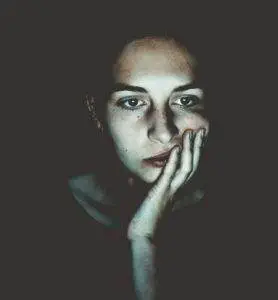
As a syndrome, fibromyalgia may manifest as any combination of a few or several of a variety of symptoms. The most common symptoms of fibromyalgia include:
- Widespread musculoskeletal pain: pain, tenderness, and/or stiffness in the muscles all over the body that may come and go or migrate from one area to another
- Fatigue, exhaustion, extreme tiredness
- Emotional and/or mental issues: depression, anxiety, PTSD
- Sleep problems, insomnia
- Cognitive issues: difficulty concentrating, memory problems, “fibro fog”
- Headaches, migraines
- Neuropathy: tingling or numbness in the hands and/or feet
- TMJ, jaw pain
- Digestive problems: irritable bowel syndrome (IBS), abdominal pain, bloating
- Bladder pain, interstitial cystitis
Other more subtle signs of fibromyalgia can include: itching all over, a skin crawling sensation (like bugs crawling on skin), extra sensitivity to smells or temperature, a tendency to shiver, or dry eyes or eye pain.
Top 5 Causes Musculoskeletal Pain Flares
The symptoms of fibromyalgia tend to come and go. Some days a person might feel almost totally fine, then other days, the fibromyalgia flares, causing more pain, exhaustion, and sometimes other symptoms. What triggers a fibromyalgia flare up?
- Hormonal changes during menstrual cycle, miscarriage, pregnancy, or postpartum
- Prolonged stress
- A sudden traumatic event, PTSD trigger, panic attack
- Changes in weather: temperature, humidity, barometric pressure
- Lack of sleep
When one of the 18 tender points of fibromyalgia is touched, it can trigger more widespread pain. These points include areas like: the front and sides of the neck, the base of the skull, the elbow, and the backs of the knees.
What Is the Treatment for Fibromyalgia?
Medical treatment for fibromyalgia typically involves a combination of medicine to alleviate pain with psychological support and lifestyle management. Drugs like Lyrica, Cymbalta, and Savella are approved for prescription for patients with fibromyalgia. Lyrica and Cymbalta are also used to treat conditions that involve nerve damage or nerve pain, like diabetes, neuropathy, shingles, while Savella works in a way that is similar to antidepressants. Other pain relievers and/or antidepressant medications may also be prescribed to help people manage pain of fibromyalgia, help them sleep better, and boost mood. All of these medications can come with unwanted side effects, and they do not help to relieve pain in every case.
People with FM pain will often receive counseling on how to manage their condition by being very careful not to exert themselves or become exhausted. Getting quality sleep and reducing stress can help to prevent fibro flare up. It can be hard for people to follow guidelines that ask them to make major lifestyle changes. Fortunately, acupuncture, herbs, and the patient support of a TCM practitioner can offer more help for people with fibromyalgia.
Acupuncture for Musculoskeletal Pain
Can acupuncture help fibromyalgia? Yes. TCM offers a comprehensive system for managing musculoskeletal pain and chronic pain, helping to heal nerve damage and restore central nervous system function, supporting mental health, relieving anxiety and depression, and addressing sleep problems. Whereas with conventional medicine, a patient might go from one doctor to another to handle all of these issues, the acupuncturist can address them all at once. The TCM point of view always takes into consideration the connection between what is going on physically with what is going on emotionally in each individual, so it is really an excellent way to help patients with fibromyalgia.

Like Western medicine, TCM recognizes that sometimes fibromyalgia can be originally caused by a traumatic event or an extremely stressful time in one’s life. Emotional upheavals cause stress to the liver, which in turn causes stagnation of blood and Qi. TCM also sees coldness and dampness as pathogenic forces that can have a profound effect on overall health. According to TCM, widespread musculoskeletal pain falls under the category of Bi Syndrome. In Bi Syndromes, cold and damp get into the body and take hold on a deep level, causing pain and stiffness. With acupuncture treatment for fibromyalgia, we seek to clear cold and damp, and restore good flow of Qi and blood throughout the body.
Acupuncture has an analgesic effect, relieving muscle pain without side effects. Moxibustion may be utilized to bring warmth to areas of the body. Cupping is another modality used to draw out damp cold and improve blood flow. Tai Qi and Qi Gong, gentle therapeutic movement practices that have been developed over 1000s of years as part of TCM, also may offer great benefits for people with FM.
A systematic review of over 400 studies of fibromyalgia treatment with TCM, acupuncture treatment was found to be effective for reducing both short term pain and long term pain.
Another review found that acupuncture and herbs worked better to reduce pain than standard medication therapy.
Top 5 Tips for Managing Fibromyalgia
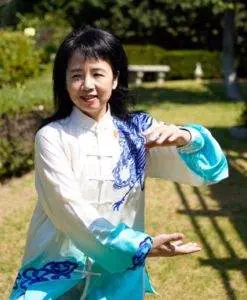
Dealing with fibromyalgia and seeing significant improvement in fibro pain will probably involve making some lasting lifestyle changes. Making adjustments to your sleep habits, food choices, and your exercise routine can make a difference in preventing the next FM flare up.
- Choose a gentle, enjoyable form of exercise. Start slowly, and gradually increase the amount you can exercise over time. Walking outdoors is a great option, as are Tai Qi and Qi Gong.
- Limit or eliminate caffeine and alcohol. These substances can interfere with getting good sleep and exacerbate liver problems. Alcohol is not safe to consume if you are taking medications for fibromyalgia like Lyrica, Cymbalta, and Savella.
- Avoid sugar, which may give you a short-lived good feeling, but will lead to a “sugar crash,” and feeling more exhausted than before. Any kind of simple carbohydrates, like foods made of white flour, or bottled fruit juices, can cause highs and lows in blood sugar. Avoid sugar substitutes and food additives like MSG, which can trigger reactions in some people.
- Focus on eating complex carbohydrates, especially vegetables. These help you have a more sustained energy throughout the day. Nuts and seeds are also good.
- Warm baths with Epsom salts can be very soothing.
Getting enough sleep at night, and even resting or napping during the day, may be essential to your well-being if you have fibromyalgia. Develop habits that allow for plenty of rest and set yourself up for a good night’s sleep.
Acupuncture Near Me for Musculoskeletal Pain
Many people who have fibromyalgia choose to try alternative medicine as a way of managing FM pain. Physiological conditions that stem from emotional stress are often not resolved through the use of medications. Acupuncture and TCM have a long history of helping people to heal from emotional disturbances that cause physical pain. Acupuncture treatment works to increase the flow of energy through the body and improve the connections between the brain and nerve endings. If you or someone you know suffers with fibro, consider acupuncture as a way to find relief from musculoskeletal pain and constant fatigue.
*This article is for education from the perspective of Traditional Chinese Medicine only. The education provided by this article is not approved by FDA to diagnose, prevent, treat and cure human diseases. It should not stop you from consulting with your physician for your medical conditions. Traditional Chinese Medicine is based on Qi, which is an invisible force that usually cannot be observed by modern science. Because science focuses on testing ideas about the natural world with evidence obtained through observation, these aspects of acupuncture can’t be studied by science. Therefore acupuncture and Chinese herbs are often not supported by double-blind, randomized trials, and they are considered alternative medicine therapies in the United States.
How To Treat Dizziness With Acupuncture and TCM
By Qineng Tan, L.Ac., Ph.D. & Xiaomei Cai, L.Ac., Ph.D.

Feeling light-headed and dizzy? Maybe you feel like your head is spinning, or that the world is spinning around you? Headache, nausea, dizziness, and vertigo are symptoms that can be caused by a variety of health problems. Acupuncture and TCM offer vertigo treatment that can help relieve that sense of dizziness and nausea, or feeling light-headed and tired all the time.
Feeling dizzy is one the most common reasons that people go in for a doctor’s visit, or even visit the emergency room. Dizziness is a fairly general term that can mean anything from feeling light-headed, woozy, faint, off-balance, or unsteady to feeling nauseated or like you’re about to pass out.
Vertigo is a specific type of dizziness that refers to a sensation of spinning, as if the room around you is moving. You might feel like you’re leaning to one side, or about to fall over. It can make you feel sick to your stomach, similar to motion sickness. In popular culture, the word “vertigo” is sometimes used to mean a “fear of heights,” but that is actually called “acrophobia.” The sensation of vertigo can be triggered by looking down from above, or looking up at something very tall, but this is not the cause of most episodes of vertigo.

Vertigo causes include migraines and problems with the inner ear. The inner ear and eyes both relay information to the brain about a person’s spatial relation to the environment, so when the functioning of the eyes or ears is disrupted, it can cause a sense of imbalance, and even nausea. Migraine headaches, particularly a specific type called a vestibular migraine, can cause pressure in the head and dizziness and nausea.
Benign paroxysmal positional vertigo (BPPV) is one type of vertigo that causes short-term bouts of sudden dizziness. Benign positional vertigo is caused by the shifting of calcium crystals (canaliths) in the inner ear. This can happen due to a head injury or simply aging.
Other inner ear problems that can cause signs of vertigo include Meniere’s disease and Labyrinthitis. Meniere’s disease is a chronic disorder related to abnormal amounts of fluid (endolymph) collecting in the inner ear. The exact cause of Meniere’s is unknown, but it develops more frequently later in life. Meniere’s disease causes attacks of vertigo that can last from a few hours up to 24 hours. Like migraines with an aura, there is often a period of time during which a set of “warning symptoms” begin to occur, such as: a feeling of uneasiness, being off-balance, headache and dizziness, queasiness, hearing loss or ringing in the ears, or extra sensitivity to sound. Once an attack of vertigo hits, it can be quite severe, causing intense pressure in the ear, blurred vision, vomiting or diarrhea, cold sweats, rapid heart rate, and feelings of fear and panic. There is currently no cure for Meniere’s.
Labyrinthitis refers to inflammation of the small parts of the inner ear, or around the nerves of the inner ear that can be caused by viral or bacterial infections, such as: a flu, measles, herpes, hepatitis, Epstein-Barr, chicken pox, or childhood ear infections. Symptoms of labyrinthitis can include: dizziness, nausea, tinnitus (ringing in the ears), and difficulty concentrating.
Lightheadedness is a similar sensation to dizziness in some ways, but is usually caused by a sudden change in blood pressure or the flow of blood to the head. You have probably experienced feeling light headed and dizzy when you get up too fast from sitting or lying down. Other causes of lightheadedness include: allergies, anxiety, anemia, hyperventilating, arrhythmia, or heavy bleeding (as during menstruation).
Dizzy spells happen to everyone once in a while. But recurrent headache and dizziness should be addressed. Acupuncture and TCM have been used to help dizziness for thousands of years and offer natural solutions to the underlying causes of vertigo.
Top 10 Causes of Dizziness

Feeling light headed and dizzy, or having headache, nausea, dizziness, can occur as symptoms of a variety of imbalances. Reasons for dizziness may include:
- Inner ear imbalance, or labyrinthitis
- Meniere’s disease
- Sleep apnea, snoring
- Migraine – vestibular migraine
- Dehydration – alcohol, diuretics
- Sinus issues
- Ear infection
- Low Blood Sugar – diabetes, hypoglycemia
- Multiple Sclerosis (MS)
- Prescription Medication side effects
Dizzy spells that occur first thing in the morning are common for some people. This can be simply due to the change in pressure in the ear when you get out of bed. Waking up dizzy due to sleep apnea occurs because this condition obstructs your breathing during the night, and you may have lower oxygen levels when you wake up. Being dehydrated is another common cause of dizziness, which is exacerbated by drinking alcohol before bed. In general, drinking too much caffeine, too much alcohol, and not enough water, or taking diuretics can all lead to dizzy spells. Low blood sugar, whether due to diabetes, or simply not eating regularly enough, can also be a cause of light-headedness. Hepatitis, HBV, or HCV can also cause dizziness.
Postural orthostatic tachycardia syndrome (POTS) causes dizziness when moving from a seated or position or lying down to standing up.
Cervical vertigo, or cervicogenic dizziness, is another type of vertigo caused by the positioning of the neck or cervical spine; in this case, the feelings of imbalance and spinning may be accompanied by neck pain. This type of vertigo may happen, for instance, after a whiplash injury.
Treatment for Vertigo
The medical treatment for dizziness and vertigo depends wholly on the underlying causes for the symptoms. If a bacterial infection in the ear is confirmed, then antibiotics may be used. In cases of BPPV, a canalith repositioning procedure (CRP) is a non-invasive technique that can help the crystals within the inner ear move back into their proper place. Migraine-related vertigo may be treated with the medications typically prescribed for migraines. Anti-nausea drugs like Dramamine may be suggested. Patients suffering from cervical vertigo may be referred to physical therapy to help improve the positioning and strength of their neck/cervical spine.
Can Acupuncture Help Dizziness?
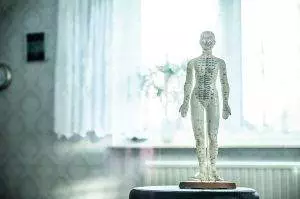
One of the central concepts of TCM is that of the root and the branches. The branches are the visible, outward signs or symptoms of a problem, while the root refers to what is going on deeper in the organ systems of the body. In the cases of dizziness and vertigo, there is deficiency in the root and excess in the branches.
Pathogenic factors involved in dizziness and vertigo are phlegm, wind, fire, and deficient Qi. When there is weakness in organs like the spleen, stomach, kidney, or heart, pathogens like wind, heat, and phlegm can take hold. The San Jiao, also known as the “triple burner,” is another important concept in TCM; one of its primary functions is to control the movements of fluids in the body so that they don’t collect and build up inappropriately. In case of vertigo, phlegm and heat develop to the point of causing stagnation and malfunctioning of the Jiao, pushing phlegm upwards in the body. An acupuncture practitioner will carefully listen and observe to discover which organ systems are out of balance, and work to strengthen those areas. For example, dizziness combined with emotional disturbances like anger and depression is a sign of too much wind or heat in the Liver. Weakness in the heart or spleen may follow a long illness or period of stress and anxiety. Too much phlegm, heat, and dampness in the stomach and spleen can result from an improper diet and too much stress.
Acupuncture and herbs to tonify these organs and clear heat and phlegm will take care of the root of the dizziness. Meanwhile, specific acupuncture points can have an almost immediate effect at relieving immediate discomfort, facilitating a natural vertigo cure.
A study conducted at a hospital in Taiwan used acupuncture to treat patients with dizziness and vertigo. The findings conclusively showed immediate improvement in symptoms.
A study of 60 patients who were admitted to an emergency room suffering from vertigo from a variety of causes, including Meniere’s and BPPV, showed that acupuncture treatment provided immediate relief of symptoms and is therefore a good alternative for dizziness due to various causes.
Top 5 Tips to Get Rid of Dizziness
Depending on the cause of the vertigo, there are different ways to manage with TCM techniques, including vertigo exercises, acupressure for dizziness, moxibustion, and foods to avoid.
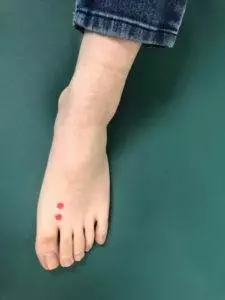
Major 4 types of Vertigo/Dizziness presentation:
- Hypertension type – When a person has high blood pressure, too much liver yang, and is overheated, it can cause dizziness. For this, we use acupressure Liver points 2 and 3 on the toes.
- Qi and Blood deficiency – if a person shows signs of anemia, or has heavy periods, hemoglobin is low, or if a person has chronic conditions, or has suffered a major injury, or recently given birth, experienced major blood loss. For this we want to ensure a good diet with plenty of soups and easy to digest foods. Moxa on the back can help to strengthen the body’s Qi and produce enough blood. Qi Gong exercise of squeezing the earlobes and outer ear up and down is helpful.
- Kidney essence deficiency – this could be due to some constitutional weakness, or due to old age, or someone who tends to have chronic illness, diarrhea. The kidney essence can’t support rising essence to the head. For this, acupressure for Kidney 1 – on the bottom of the foot.
- Phlegm stagnation – when the middle jiao is not working due to stagnation of phlegm creating blockage so Qi cannot ascend. This happens when people are overweight, or have poor digestion, diarrhea. Avoid dairy and fried foods, which encourage phlegm. Moxibustion treatment to the back is helpful, and applying pressure to Stomach-36 acupressure point can help the middle jiao open up.
- Neck Pain – if a neck problem is causing a blockage, due to a neck disease or bulging disc, unhealthy cervical disks, compression, tension, and muscle spasms can block upwards energy. Exercises to encourage the health of the neck discs, loosen up the muscles and allow flow of Qi and blood up to the head. Your acupuncture practitioner will recommend neck exercises to help with this.
Acupuncture Near Me for Dizziness
Vertigo and dizziness may not be life-threatening symptoms, but they can have a big impact on your daily life. Frequently being blindsided by unexpected dizziness, spinning sensations, nausea, and headaches is unsettling and debilitating. Medications can be helpful in some cases, but they can also cause unwanted side effects. Getting to the root cause of vertigo with acupuncture and TCM will help get rid of dizzy spells so they don’t keep coming back.
*This article is for education from the perspective of Traditional Chinese Medicine only. The education provided by this article is not approved by FDA to diagnose, prevent, treat and cure human diseases. It should not stop you from consulting with your physician for your medical conditions. Traditional Chinese Medicine is based on Qi, which is an invisible force that usually cannot be observed by modern science. Because science focuses on testing ideas about the natural world with evidence obtained through observation, these aspects of acupuncture can’t be studied by science. Therefore acupuncture and Chinese herbs are often not supported by double-blind, randomized trials, and they are considered alternative medicine therapies in the United States.
How to Treat ADHD With Acupuncture and TCM
By Xiaomei Cai, L.Ac., Ph.D. & Qineng Tan, L.Ac., Ph.D.

Does my child have ADHD? Do I have ADHD? ADD/ADHD is a mental health disorder that causes children and adults to have problems with concentration, hyperactivity, or both. Trouble in school, problems at work, physical restlessness, mood swings, and frequent feelings of frustration can all be signs of ADHD in children and adult ADHD. Acupuncture and TCM offer a way to help symptoms of ADHD holistically, without the side effects caused by ADHD medications.
ADD stands for Attention-Deficit Disorder, referring to the poor concentration and problems staying on task that are often experienced by people with this neurodevelopmental disorder. Children and adults with ADD are easily distracted; they may appear to be “daydreaming” a lot of the time. ADHD stands for Attention-Deficit Hyperactivity Disorder, in reference to cases in which a person also exhibits impulsiveness, or difficulty sitting still. ADHD usually starts in childhood; often, ADHD symptoms carry over into adulthood and continue to cause problems if not addressed.
While ADHD in adolescents and children has been studied widely in recent years, the causes are still unknown. It is generally believed to be due to disordered biological processes occurring in the brain, and considered to be possibly genetic in origin. ADHD may be related to atypically low levels of chemical neurotransmitters like dopamine. Metabolism in the part of the brain that controls attention, movement, and social interaction appears to be different in brain imaging tests of children with ADHD.

For children with ADHD, this may lead to problems in school, even learning disabilities. Interrupting, not being able to wait their turn, fidgeting, and being forgetful or seeming “careless” are the obvious outward signs of ADHD that can make school challenging for children, and cause them to be considered disruptive in the classroom.
Adult attention disorder may show up as reckless behavior (traffic tickets, accidents, etc.), problems in relationships, trouble organizing things like paying bills or missing appointments, losing belongings, not being a “good listener,” or anger management issues.
According to current conventional medical thought, ADHD is considered a psychiatric condition: a product of chemical imbalance in the brain. ADHD in children is associated with behavioral problems that make it difficult to excel in school. Adults with ADD may have trouble finding success in their daily work and lives. For these reasons, people will consider getting medical treatment for ADHD. As with most psychiatric issues, treatment tends to focus on a combination of behavioral counseling and pharmacological intervention. Medications used to treat ADHD in both children and adults are stimulants that are thought to help boost attention span and a person’s ability to focus.
Acupuncture and TCM herbs can be used as an adjunct therapy or an alternative to medical treatment with drugs for ADHD in both children and adults.
Top 3 Types of ADHD:
ADD or ADHD symptoms manifest in a unique combination in each individual. Presentations of ADHD are divided into three categories:
- Inattentive/easily distracted type
- Hyperactive, impulsive behavior type
- Combined type, exhibits both inattention and hyperactivity
While boys are statistically more likely to be diagnosed with ADHD, this may have something to do with the fact that ADHD symptoms show up differently in girls than they do in boys. Parents and teachers may have a stronger tendency to explain girls’ behavior as being personality-based (“talkative” or “tomboy-ish”) rather than a serious problem worthy of attention. Girls may also be more likely to compensate for their ADHD, finding coping mechanisms that help them get along with teachers and appear to be OK, even if they are struggling with schoolwork or social problems.
ADHD and ASD (autism spectrum disorder) can often present in similar ways, and can coexist in some cases. Over half of people who have been diagnosed as autistic also show signs of ADHD, while about a quarter of people with ADHD are also considered to be on the autism spectrum. Some of the key differences between these two neurodevelopmental disorders are that children with ADHD are much more likely to show improvement in their behaviors as they grow up, and that people with ASD are more likely to exhibit “hyperfocus” rather than distraction.
When symptoms of ADHD are found in children, it is not unusual for parents to recognize that they, too, have faced similar struggles in their lives. Research suggests that about half of the time that a child is diagnosed with ADD or ADHD, at least one of their parents shows signs of the disorder, as well.
Top 10 Symptoms of Adult ADHD

Because ADD/ADHD is a mental health issue, it can be difficult to clearly identify. Many of the symptoms associated with ADHD are similar to those of anxiety. It is not uncommon for people with adult ADHD to also have anxiety or depression, so the conditions overlap.
- Trouble focusing on tasks or multitasking, poor concentration
- Impulsive behavior, recklessness
- Disorganization
- Poor time management skills, difficulty prioritizing or staying on topic
- Restlessness, sleep problems
- Easily frustrated
- Frequent mood swings
- Lose temper easily
- Difficulty articulating thoughts to others
- Difficulty coping with stress
Of course, everyone experiences some or all of these behaviors and emotions at some point in their lives. But if these problems began in childhood and continue to cause problems in daily life on an ongoing basis, then it may be due to adult ADHD.
Test for ADHD
Evaluation for ADHD is usually performed by a mental health professional, pediatrician, or family physician. There is no one specific test to determine if a child or adult has ADHD. Diagnosis is usually based on a comprehensive discussion with the patient and family members to determine whether a person displays 5-6 or more commonly recognized symptoms of ADD or ADHD, according to guidelines set by the American Psychiatric Association.
Brain imaging methods such as MRIs are used to conduct research about ADHD, but they are not part of a typical diagnostic process for the average person.
Medications for ADHD
Doctors commonly treat ADD or ADHD with stimulant medications that increase levels of dopamine and norepinephrine and are meant to help them focus better. These medications are based in amphetamine (Adderall, Dexedrine, etc.) or methylphenidate (Ritalin, etc.). Some are short-acting and need to be taken in 4-hour intervals; others are longer-acting, or designed to last all day.
While these medications are considered safe for children, they do not work in every case, and they carry a variety of side effects, including: changes in appetite, stomach problems, and sleep problems. These types of drugs constrict the blood vessels and can cause heart problems like arrhythmia, high blood pressure, and even heart attacks in some patients. They can also have a negative impact on mood and mental health, causing a child or adult to become even more irritable and/or anxious. In some cases, stimulant medications have been linked to suicidal ideation and aggressive behavior in children and adolescents.
Acupuncture for ADHD

TCM philosophy acknowledges the interconnectedness of the mind, spirit, and body. In the TCM view, problems like ADHD are concerned with imbalances of the Heart, the Mind, and the Shen (spirit or emotions). Pathogens like fire, wind, and dampness can invade the head, affecting the mind as well as the physical organs of the body.
Problems with concentration and restlessness stem from wind and excess heat in the head. Feelings of anger and frustration are often rooted in Liver Qi stagnation. Troubles with the appetite and digestion are often connected to deficiency in the Kidneys and Spleen. Thus, acupuncture treatment and herbal preparations will be designed to clear heat, get Liver Qi moving freely, and strengthen the Spleen and Kidneys.
The medications often prescribed to treat ADHD can actually have further negative effects on the heart and kidneys, causing deficiencies of Liver Qi and Kidney Qi.
A research study conducted with almost 600 children showed that acupuncture had an 84% efficacy rate. A study to test the effectiveness of electro-acupuncture on preschoolers with ADHD found not only that the majority of children showed improvement of symptoms, but that the improvement was still evident at a six-month follow-up.
Auricular acupuncture, in which points on the outer ear are stimulated with very tiny, thin needles or seeds that can be stuck to the ear and gently massaged daily, can be particularly effective for children, as it is very minimally invasive.
Certain herbs used in formulations to address attention deficits have been shown to help improve learning and memory.
Acupuncture Near Me for ADHD
If you or your child is struggling with attention deficits or impulsiveness, it can be stressful and scary to decide what to do about it. Poor concentration and hyperactivity can get in the way of doing well in school or work, and make it difficult to have positive social interactions and form relationships. It is certainly important to address these issues rather than ignoring them and hoping they’ll go away. However, many people are concerned that medications may have negative side effects, or be habit-forming. You may want to consider acupuncture as a natural way to address ADHD.
*This article is for education from the perspective of Traditional Chinese Medicine only. The education provided by this article is not approved by FDA to diagnose, prevent, treat and cure human diseases. It should not stop you from consulting with your physician for your medical conditions. Traditional Chinese Medicine is based on Qi, which is an invisible force that usually cannot be observed by modern science. Because science focuses on testing ideas about the natural world with evidence obtained through observation, these aspects of acupuncture can’t be studied by science. Therefore acupuncture and Chinese herbs are often not supported by double-blind, randomized trials, and they are considered alternative medicine therapies in the United States.
How to Treat TMJ With Acupuncture and TCM
By Qineng Tan, L.Ac., Ph.D. & Xiaomei Cai, L.Ac., Ph.D.
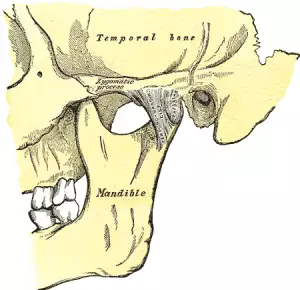
What is TMJ? “TMJ” is an acronym for “temporomandibular joint,” which is the double joint structure that attaches the lower jaw to the skull. “TMJ” is also used as a general term to refer to disorders of the jaw joint. Popping or clicking of the jaw joints, tension or pain in the jaw, grinding teeth, headaches, neck pain, and shoulder pain can all be signs of a TMJ disorder, or TMD. Acupuncture and TCM offer relief from TMJ jaw pain and inflammation.
The jaw joint is totally unique among joints in the human body in a few ways. It is really two joints that must always work together; you cannot choose to just move one side of your jaw. Also, the temporomandibular joint has two ways in which it moves; it “hinges,” and then, it “slides.”
Hinge joints, like the knees and elbows, allow flexion and extension on one plane, while remaining stabilized by a complex group of muscles, ligaments, and other connective tissues. Most of these joints are made of bones that are “molded” to fit and move together. Gliding joints, also called plane joints, like those in the ankles, wrists, and vertebrae, have flat sides that slide alongside each other when they move. The jaw joint combines both of these actions. Essentially the movement of the jaw is a kind of dislocation by design. Small discs of cartilage help to cushion the areas where the jawbone interacts with the sides of the skull in front of the ears.
It can be difficult to determine the exact causes of “TMD,” or temporomandibular disorders that cause pain and dysfunction. Injury to the jaw, dislocation of the jaw, inflammation of tissues, arthritis, and bruxism (clenching or grinding the teeth and jaw) can all potentially lead to jaw pain or clicking in the jaw. Erosion or damage to the cartilage sometimes causes TMD, impacting the usually smooth motion of the opening and closing of the jaw. Structural issues like missing teeth or an uneven bite can cause jaw problems. Dental and orthodontic work that requires the patient to hold the mouth open for long periods of time can sometimes lead to TMJ pain. Habitual movements like teeth grinding, biting on things like pencils, nail biting, or leaning your chin on your hand can also contribute to TMJ pain. Chronic pain syndromes like fibromyalgia can also cause jaw pain.
Most cases of TMJ disorders resolve themselves over time, usually within a few to several months. Resting the jaw and eating soft foods is usually recommended. Medical treatment usually involves medications to reduce inflammation and relieve pain while waiting for the jaw joint to gradually regain its normal function. Only in rare cases is surgery necessary to get rid of jaw pain.
TMJ, or myofascial pain in the muscles around the jaws, is experienced by a third or more of all adults at some point in their lives. TCM modalities like acupuncture can help alleviate the pain and impeded mobility of the jaw joint caused by TMJ disorders.
Top 10 Symptoms of TMJ

Pain around the jaw joints that comes and goes is the most common complaint of people with TMJ disorders. However, problems with the jaw can contribute to pain and tension in other parts of the head and shoulders, too. The most common signs of TMJ include:
- Pain in cheeks, tension in the jaw
- Jaw clicking, popping of jaw bones
- Limited movement of jaw, can’t open jaw normally
- Clenching of jaw, grinding teeth at night
- Tooth pain, pain in the back teeth
- Ear pain, ringing in the ears, tinnitus
- Headaches, migraines, pain behind eye, sensitive to light
- Stiffness in shoulders or neck, pain in neck, shoulder pain
- Numbness or tingling in arms, hands, or fingers
- Dizziness, vertigo
The combination of hard bony structures, muscles, and cartilage that are all involved in TMD causes TMJ pain that is hard to pinpoint because it may move around, and come and go. Most people describe the sensation as a dull ache. Some people don’t experience pain, but still have trouble with jaw clicking or opening and closing the jaw.
What Is the Treatment for TMJ?

A doctor or dentist may check for signs of TMJ by observing and manually examining the movement of the jaw joint. Dental X-rays may be used to help determine the cause of jaw pain. CT scan or MRI may be recommended to get a more detailed look at the bones and cartilage.
The primary recommendations for jaw pain and clicking is to rest the jaw as much as possible and eat only soft foods. Physical therapy (PT) can help strengthen the muscles of the face and encourage people to change habitual behaviors that might be contributing to TMJ. Wearing a splint or bite plate keeps the mouth and jaw in place and prevents grinding teeth in the night. This combination of PT and splinting is called stomatognathic treatment. If pain is serious enough to require further medical treatment, doctors will usually prescribe either pain relievers, anti-inflammatories, muscle relaxants, or some combination of these. Surgery is only used in rare cases when the jaw has become “locked,” or TMJ inflammation and pain has become chronic.
Acupuncture and TCM treatment offer a way to reduce inflammation and pain related to TMJ disorders without risky surgical procedures or the adverse side effects sometimes caused by corticosteroids and other medications.
Acupuncture Treatment for TMJ
Acupuncture can work to reduce inflammation and pain from many different conditions, including musculoskeletal disorders like TMD. Acupuncture is effective at reducing sensations of pain, both by reducing inflammation in areas from which the pain is originating and by stimulating the release of endorphins and other neurotransmitters that help boost feelings of well-being. Acupuncture treatment can also help the muscles involved with jaw function to relax, alleviating the “clicking” or “popping” associated with TMJ disorders.
In TCM theory, TMJ is often related to what we call different types of “obstruction” syndrome. Stress and trauma, both physical and emotional, can cause Qi stagnation and/or blood stagnation. Pathogenic forces like cold, heat, wind, and damp can cause painful obstruction, or blockages of energy and blood in certain areas of the body. People suffering from TMJ do not necessarily only have dental pain or myofascial pain, a clicking jaw, or limited movement. They may also be experiencing a variety of other symptoms that are actually related. A TCM practitioner will look at the whole picture of what each patient is feeling, and treat accordingly.
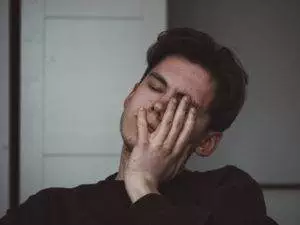
For example, a person with Liver Qi stagnation may have:
- tension in the facial muscles
- neck pain
- feelings of anger or anxiety,
- ringing in the ear, tinnitus
- headaches
A person with a Wind/Cold Bi Syndrome presentation might feel:
- acute onset of pain
- pain moves around from one area to another
- aversion to wind and cold
- fever, chills
- ear ache, ringing in the ears
As a holistic form of medicine, TCM works not only to relieve jaw pain and swelling, but to get to the root of the problem.
A comparative study designed to evaluate TCM treatment for TMJ found that patients who received acupuncture treatment reported less pain and muscle tenderness than those that did not.
A clinical study that compared groups of patients who received acupuncture treatment for TMJ pain and limited motion to patients treated with decompression splints. Both groups experienced reduction in pain and increased mobility, and the researchers concluded that acupuncture can be considered beneficial as either an adjunct or alternative treatment.
In some cases, a stiff, painful jaw joint can be a secondary symptom of another, more systemic problem like rheumatoid arthritis or fibromyalgia. These conditions can also be addressed with acupuncture.
Acupuncture Near Me for TMJ Disorders
TMJ disorders interfere with a person’s most basic activity: eating. While most cases of TMD improve within a matter of months with the proper rest, they can cause a lot of pain and frustration while a person is waiting to heal. Acupuncture and TCM herbs can help relieve TMJ pain and restore normal jaw function, helping people get back to normal more quickly than rest alone. At Art of Wellness, we have over 30 years of experience helping patients with musculoskeletal disorders and pain of all kinds find relief and a return to their usual mobility.
*This article is for education from the perspective of Traditional Chinese Medicine only. The education provided by this article is not approved by FDA to diagnose, prevent, treat and cure human diseases. It should not stop you from consulting with your physician for your medical conditions. Traditional Chinese Medicine is based on Qi, which is an invisible force that usually cannot be observed by modern science. Because science focuses on testing ideas about the natural world with evidence obtained through observation, these aspects of acupuncture can’t be studied by science. Therefore acupuncture and Chinese herbs are often not supported by double-blind, randomized trials, and they are considered alternative medicine therapies in the United States.
How to Treat Morning Sickness With Acupuncture and TCM
By Xiaomei Cai, L.Ac., Ph.D. & Qineng Tan, L.Ac., Ph.D.

Nausea or vomiting during the first few months of pregnancy, known as “morning sickness,” is experienced by more than half of all pregnant women. Severe nausea and vomiting, or morning sickness that lasts all day or further into pregnancy–called Hyperemesis Gravidarum—is less common, but can cause health problems for both the mother and the developing fetus. Acupuncture and TCM provide a natural and effective alternative for dealing with both mild and severe morning sickness.
“Morning sickness” is somewhat of a misnomer, although nausea during the first several weeks of pregnancy is often experienced early in the day, before eating. Having an empty stomach can exacerbate the queasy feeling of morning sickness. But why is it called morning sickness when it lasts all day? As many women know, morning sickness can strike at any time of day or night, and some women feel nauseous throughout the day.
The majority (at least 70%, maybe more) of all pregnant women experience some nausea during early pregnancy. Morning sickness usually begins occurring when a woman is around 6 weeks pregnant, and goes away by about the 12th week of pregnancy, or the transition into the second trimester. However, some women will continue to feel morning sickness later in pregnancy.
Medical science has not determined exactly what causes morning sickness, although it is generally thought to be related to changes in hormones, particularly an increase in hCG, known as the “pregnancy hormone.” A recent research study found that a specific genetic sequence present in some women may account for increased nausea during pregnancy. Some researchers at Cornell University have posited that morning sickness may be an evolutionary development that prevents harm to babies in utero by keeping the mother’s diet free of potentially toxic substances. They observed that in cultures where the staple diet relies more on starches and less on meat, pregnant women were less likely to experience morning sickness.
For most women, the morning sickness that occurs in the early months of pregnancy is not dangerous to their health or that of the fetus. However, feeling nauseous a lot of time is certainly uncomfortable. Some lifestyle habits can help get the nausea and vomiting under control. Acupuncture treatment and herbs can help even more to provide relief from the daily nausea of morning sickness.
For some women, morning sickness is more than just a nuisance. Not being able to keep any food down and vomiting repeatedly throughout the day for weeks or even months on end can cause serious health issues for mom and baby. Lack of proper nutrition, dehydration, and weight loss can lead to unwanted outcomes later on, including pre-term delivery and low birth weight of the infant. Hyperemesis gravidarum requires treatment. Acupuncture help for morning sickness is a natural alternative to drugs used to treat nausea.
Top 5 Symptoms of Morning Sickness
The symptom of nausea during early pregnancy is often what first lets a woman know she might be pregnant. Feeling queasy, dizzy, sensitive to smells, an aversion to certain foods, and occasionally vomiting are the most common signs of morning sickness. The sensations can be likened to those of motion sickness, or having a hangover. Many women report having a metallic taste in their mouth, and/or more saliva, which can contribute to feeling nauseated.
Severe morning sickness is a more serious problem. Signs of hyperemesis gravidarum include:
- Vomiting 3-4 times per day or more
- Feeling light-headed or dizzy after vomiting
- Dehydration: thirst, dry mouth, not having to urinate normally
- Heart beating fast, heart palpitations
- Losing weight during pregnancy (more than 10 pounds)
Some women may be at higher risk for hyperemesis gravidarum if they are: having multiples (twins or triplets), if their mother also had severe morning sickness (genetics), or if they generally tend to have a more sensitive stomach, even when not pregnant. Stress, lack of sleep, and hot weather can all trigger more nausea during pregnancy.
Medical Treatment for Morning Sickness

Nausea and vomiting during pregnancy is challenging to treat effectively, as care must be taken to avoid drugs that could harm the mother or the developing fetus. Often women are not treated for severe morning sickness until they have become so sick and dehydrated from vomiting that they need urgent care. At this point, a woman may need to be hospitalized and treated intravenously for dehydration.
There has been a somewhat standard practice of people recommending and using over-the-counter antihistamines or antiemetics like Pepto-Bismol to help quell nausea. In a 6-year study of women with hyperemesis gravidarum, researchers found that women who had used medications like Benadryl during pregnancy were more likely to experience adverse outcomes. A combination of vitamin B-6 and doxylamine is sometimes recommended. This drug combination is sold as an OTC sleep aid. Phenothiazine is sometimes prescribed for women with morning sickness, but it’s efficacy and safety for this use has not been studied extensively.
These medicines are used because they seem relatively risk-free, but they still carry the risk of side effects, like drowsiness, headaches, dry mouth, etc. In many cases, they are not totally effective. Acupuncture and TCM herbal formulations offer relief from nausea and other pregnancy issues without any negative side effects.
How Can Acupuncture Treat Nausea?
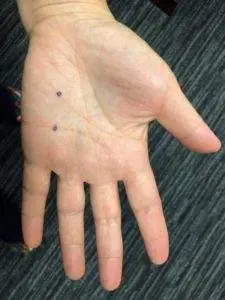
According to TCM, Qi (life force energy) moves through the body along meridians, channels that connect the organ systems. The Chong meridian connects the reproductive organs to the brain and the heart. This particular energy channel is related to all concerns having to do with female reproductive health and gynecological conditions, including menstruation and pregnancy. Its relation to the heart means that it is also connected to feelings of anxiety, panic attacks, and palpitations.
Each woman’s experience of morning sickness is different, so a TCM practitioner will look carefully at each individual patient to determine the specific imbalances causing the nausea and address them appropriately with acupuncture and herbs.
In TCM theory, morning sickness and hyperemesis gravidarum are related to the stomach, spleen, and liver. When a woman becomes pregnant, blood and Qi are strongly directed towards the pelvic area to nourish the womb (uterus) and the developing fetus. This surge of energy will also affect the digestive organs, potentially causing stomach problems. This is more likely to happen to women who have had weak digestion previously, perhaps due to a lack of proper functioning of the spleen. Likewise, the direction of more blood to the reproductive organs can cause a decrease in Yin energy in the Liver, thus increasing Yang energy. Liver fire can also trigger imbalance in the Stomach, leading to nausea and vomiting.
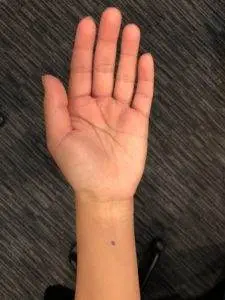
A specific acupressure/acupuncture point on the wrist is especially helpful for reducing nausea. This acupoint is known as PC6, or Nei Guan, 内关, which translates as “Inner Pass.” You may have seen special bracelets or wristbands recommended to help reduce nausea due to morning sickness (or motion sickness or postoperative nausea related to opioid medications). These products are designed to stimulate this acupressure point for nausea. While applying gentle pressure to this point can certainly be beneficial for women experiencing morning sickness, acupuncture treatment that includes this point and others is even more effective.
A systematic review of published studies related to the use of PC6 stimulation for nausea and vomiting found that this treatment produces clinically effective results, not only for pregnant women, but also for patients in cancer treatment and other people experiencing severe nausea.
A randomized trial conducted in Sweden to study the use of acupuncture treatment in conjunction with standard medical treatment for women with hyperemesis gravidarum found that acupuncture was not only very safe and free of side effects, but that women who received acupuncture were able to get over their severe nausea and vomiting more quickly than women getting only the standard treatment.
A study conducted at a maternity hospital in Australia compared women who received acupuncture for morning sickness to groups receiving placebo treatment or no treatment. The women who received acupuncture reported significantly less nausea and retching.
Top 5 Tips to Help Morning Sickness
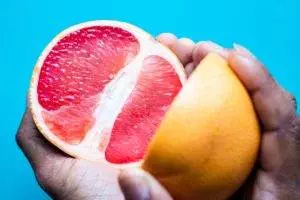
Naturally, pregnancy is a time to embrace new lifestyle habits that are beneficial to both mother and baby. Eating a healthy diet during pregnancy can be especially difficult if you are feeling nauseous. Getting enough nutrition and rest during pregnancy is vital.
- Eat plain, “bland,” warm foods. Avoid anything that is spicy, salty, fatty, fried, or cold.
- Eat smaller meals/snacks at regular intervals throughout the day, so as to avoid the stomach being empty or too full, and to keep blood sugar levels steady.
- Sip water slowly and regularly. Don’t gulp down large amounts of liquid all at once.
- Sip ginger tea, made by steeping a few slices of fresh ginger.
- Actively prioritize stress reduction. Anxiety can exacerbate the nausea of morning sickness. Take frequent rest breaks. Ask your TCM provider to show you some gentle meditative exercises like Tai Qi or Chi Gong that can help relieve stress and nausea.
Talking with a trusted healthcare professional who understands what you’re going through can be helpful for calming anxieties about your pregnancy. Finding an experienced acupuncturist who can help you through any and all of the symptoms and worries that may come up during pregnancy, birth, and postpartum care can help to ease stress and discomfort.
Acupuncture Near Me for Morning Sickness
Acupuncture is an excellent modality not only for helping to relieve nausea due to morning sickness; TCM is a holistic form of medicine that can help women throughout pregnancy. Many discomforts and concerns may come up as a woman anticipates birth. Working with an integrative health provider who has a thorough understanding of gynecology and obstetrics from both Eastern and Western medical points of view can be beneficial to the physical and emotional health of both mother and baby. At Art of Wellness, we have over 30 years of experience helping women attain better reproductive health: from painful periods, to fertility issues, through pregnancy, postpartum, and menopause.
*This article is for education from the perspective of Traditional Chinese Medicine only. The education provided by this article is not approved by FDA to diagnose, prevent, treat and cure human diseases. It should not stop you from consulting with your physician for your medical conditions. Traditional Chinese Medicine is based on Qi, which is an invisible force that usually cannot be observed by modern science. Because science focuses on testing ideas about the natural world with evidence obtained through observation, these aspects of acupuncture can’t be studied by science. Therefore acupuncture and Chinese herbs are often not supported by double-blind, randomized trials, and they are considered alternative medicine therapies in the United States.